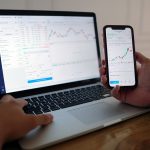Trading ETFs on the stock market
What is an ETF?
ETF stands for Exchange Traded Fund is essentially no different than any other fund, but it trades intraday just like you would buy or sell a stock.
What is an index?
An index is the average of the prices of a group of related stocks, representing its total value.
When someone says they are buying “the market”, they essentially purchase every security in that index at their proportionate share based on its valuation.
The most common indices are the Dow Jones Industrial Average, Nasdaq Composite, S&P 500, etc.
Other indices include agricultural goods (wheat, soybeans), precious metals (gold) or even social media companies (Facebook).
Indexes can be very broad or specific to whatever criteria you want them to be composed of. An index fund is just a fund that tracks an index.
How do ETFs work?
An ETF, or exchange-traded fund, is a marketable security that tracks an index of other assets.
They are traded on the major U.S. exchanges during regular trading hours just like stocks, have high liquidity and can be purchased/sold at any time during market hours with limit orders, stop loss or day orders.
Other funds trade only after the markets close (like mutual funds), but they can trade them intra-day as quickly as stocks because ETFs are technically funded.
By using limit orders to specify what price you are willing to buy them at or sell them at if you ever need to cash out before the end of the trading day.
Benefit of owning an ETF over index funds
ETFs are essentially index funds, but instead of buying every single security in that index at their proportionate share based on its valuation, you can buy one security representing that whole market.
It’s much easier to buy and sell because there are no minimum investment requirements, you don’t have to worry about your broker applying capital gains tax if you need to withdraw early, etc.
How do I invest in ETFs?
Most users utilize a brokerage account to trade financial securities, including ETFs, because that is typically where the most advanced trading tools are offered for advanced investors or day traders.
Since they can trade them intraday like stocks, limit orders, stop loss or day orders can be used to buy/sell at whatever price you want.
Your brokerage account would have information about which ETFs are currently available for purchase, but it’s up to the individual broker what prices they will offer for each one.
Some brokers even allow investors to trade them commission-free. The best way to find out is by simply logging in to your brokerage account and checking their website for more details on all of their latest promotions that apply to your investing plan.
It does not matter which one you choose; they will typically offer plenty of research tools or trading platforms along with options for managing risk by utilizing stop-loss orders, etc.
Trading ETFs on the stock market
To conclude, ETFs are traded intraday just like stocks and can be bought/sold at whatever the current market price is.
They also allow you to buy every security in that index at their proportionate share based on its valuation by simply buying one security representing that whole index.
The best way to invest is by utilizing a brokerage account with plenty of research tools or trading platforms and options for managing risk by utilizing stop-loss orders, etc.
ETF portfolios will typically hold hundreds or thousands of individual securities, but this is perfectly fine.
Because they don’t need to do any complicated analysis: if it matches the index, it gets included; if not, it doesn’t matter as long as the index accurately reflects what it is supposed to be measuring.
In conclusion
ETFs are unique in that they combine the diversification of an index fund with the ability to trade intraday like stocks.
Over the last decade, they have grown immensely in popularity and are almost as standard on the modern stock exchange as mutual funds were 20 years ago.














